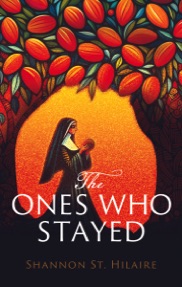Shannon St. Hilaire’s debut novella The Ones Who Stayed is fiction based on the horrible truth of the Salvadoran Civil War (1980-1992). A war the United States government supported. St. Hilaire volunteered in El Salvador, working and living with an American nun. The prologue and epilogue reflect the author’s time there long after the war and what she learned from both the nun and locals who “told their stories with a bravery and a peace I could not understand.” It is also a love story.
Agnes, an American nun, serves in El Salvador during the Civil War. One of her duties is retrieving the severed heads of young men who fought in the resistance and returning them to their mothers. The vivid, gritty first chapter thrusts the reader into the atrocities of the war, then shifts to the unbearable pain of the grieving mother.
One of St. Hilaire’s strengths is balancing these horrors with the resilience and perseverance of the people. Some scenes are painful to read, but St. Hilaire never dips into sensationalism or graphic depictions. Instead she focuses on the humanity, shepherding the reader through history with respect.
In the largely Catholic country, nuns and clergy are usually respected, and Mass is a sacred place. But as the war escalates, no one and no space is safe. Hermana Agnes is left alone in the run down convent house, as her sisters flee in fear, “This had become a place of leaving.” Their reason for returning to the United States is based on true events. In 1980, a group of American nuns arriving in the country was kidnapped, violated, and murdered by soldiers. Archbishop Óscar Romero was assassinated while giving mass in San Salvador. St. Hilaire deftly portrays the uncertainty and anxiety produced by every backfiring car, scrabble of rats in the walls, and men walking behind Agnes on dark streets.
Agnes only finds solace beneath a mango tree in the walled garden shared by the convent and clergy house. It is here that she meets a Salvadoran priest, Padre Raúl. Agnes finds friendship and guidance from Raúl, who carries a book on liberation theology, rather than a bible. He takes her with him to bring supplies and food to the guerrilleros hiding in the mountains to escape the junta’s soldiers. As Agnes witnesses more hardship and suffering, she struggles to reconcile her faith with her anger at the injustice that cries out for action. Even the church school where she teaches is targeted. One morning she arrives to find mangled bodies hanging from the entrance gate. “She stared at the bodies, because they made her angry, and anger was power.”
Approached to join the resistance, Agnes steps further and further away from Church sanctioned actions, finally finding a purpose. “She felt that she had only now discovered it after hiding behind conformity her whole life. Conformity was another word for safety, and she was not alive if she was not doing something worth dying for.”
The writing moves effortlessly from Agnes’s inner struggle to a lyric appreciation of the land and people. As Padre Raúl points out el Torogoz, the national bird of El Salvador, Agnes ponders, “How a person could be delighted in this world was beyond her, but he was, and it was a balm to be near it. . . . Looking back, she realized she had not felt anything like delight in a year, or perhaps two.” Invited to a secret meeting of the resistance, Agnes “felt in the air a new energy; there was something alive in this place, more than the people themselves. It was the spirit of freedom, of undying hope, of El Salvador. This energy permeated the room, and sank into her.”
Agnes and Raúl grow closer as they take more dangerous risks to help people, building to a heartbreaking climax. As St. Hilaire says in the author’s note, “I will never be able to understand what the Salvadoran people went through, but I felt compelled to capture a small part of it on the page, to share with an American audience some version of what the people I met were so generous and brave to share with me. This story is for the people who stayed, at enormous cost to themselves, and whose staying made all the difference.”
Purchase the book here.
Diane Englert is a writer, actor, accessibility consultant and provider. She writes for the website Write or Die Tribe and her work also appears in Ruminate Magazine, From the Depths, What Rough Beast, and We’ll Never Have Paris. She wrote libretto for several mini musicals that were all produced. Diane has a BFA in theater from University of Utah and an MBA from Marylhurst University.

The Ones Who Stayed
by Shannon St. Hilaire
Resilience in the
Time of War
Book Review by Diane Englert